As a pet parent you love spending quality time with your furry BFF — playing with their toys, cuddling and more.
That said, advice from animal care experts is to make sure some of your time with a pet is devoted to preventative routines and activities that contribute to their health and wellness. As a bonus, you’ll likely also reduce pet care costs over the course of your dog or cat’s life.
For tips on how prevention can lead to cost-of-living savings in the long term, we turned to a few pros who offered up their best pet parenting advice. Here’s what they recommend:
Resist the urge to overfeed
“This is probably the number one way you can avoid a big vet bill,” says animal nutritionist Kylie Hogan. Overfeeding a pet can lead to weight gain, which is hard on an animal’s joints and can lead to arthritis, heart disease, diabetes, and other serious medical issues — all of which require costly medical intervention.
“Overfeeding is tricky because every brand is going to have a different feeding guide,” says Hogan. You can consult your vet if you need more specialized guidance than is provided by the pet food producers, on how many calories your pet should be eating each day.
In addition to these guidelines and vet insight, your pet’s size, breed, and level of activity, as well as lifestage should all be considered in calorie calculations. (And don’t forget to also take their treat consumption into consideration!)
“It takes a little bit of math and it takes a little bit of work,” says Hogan, “but that's going to be the best combatant to avoid overfeeding.”
Develop a healthy grooming and bathing routine
How often do you need to bathe your pet?
This, too, can be breed-specific and depend on where you live, as well as how much time your pet spends outdoors or being active. Experienced pet parents know that there are routine baths and there are emergency, “my dog just rolled in something putrid” baths. But the recipe for regular bathing varies.
“The general rule for small dogs,” says Bosely’s store manager, Kelsi Campbell, “is not more than once a week, usually closer to once every couple of weeks or every month.”
“A large dog could be every week, but no more than once a week,” she adds, explaining that more frequent bathing is required for dogs who are often outdoors, doing activities like swimming or hiking.
Bathing and brushing gives pet parents an opportunity to check their pets for ticks, fleas, and other parasites, which can cause long term illnesses. It also ensures that a pet’s fur remains free from matting. A matted coat can lead to skin infections and extreme discomfort for your pets.
“Just brushing alone helps the skin promote oils naturally, keeps a healthy coat, and can help avoid dry skin,” says Campbell.
Stay one step ahead of parasites
Speaking of little critters, a visit to the vet each spring will keep you up-to-date on which parasites you need to be aware of, in the area where you live.
From ticks to fleas to mosquito-borne heartworms, it’s far more cost-effective to treat your pet with preventative medicines annually than to deal with the infections and diseases these pests transmit.
If you live in a region where ticks are common, it’s a good idea to have a tick removal tool on hand and a thorough understanding of how to use it.
Prioritize mental and physical exercise
“A lot of people don't know they have to mentally stimulate their pets,” says Bosley’s assistant manager Charlaine Lemay, who suggests hiding snacks for your BFF to find, or giving them treat puzzles to work their way through.
For dogs, she says, “anything that has to do with the nose is always good. Because that's one of their best assets. They use their nose for everything, so anything that involves finding things is always good.”
Pets that lack mental exercise can experience boredom … which can lead to destructive (and expensive) behaviours.
“It helps keep their joints healthy and it helps with your connection to your pet which helps with their health too. They say that animals are therapeutic for humans, the same works in reverse. Having that connective time together is important.”














































